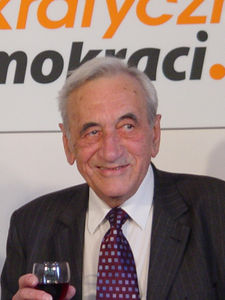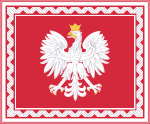Tadeusz Mazowiecki
| Tadeusz Mazowiecki | |
 |
|
|
Prime Minister of Poland
Premier during the Polish transition to democracy |
|
|---|---|
| In office August 24, 1989 – January 12, 1991 |
|
| President | Wojciech Jaruzelski |
| Vice PM | Leszek Balcerowicz, Czesław Janicki, Jan Janowski, Czesław Kiszczak |
| Preceded by | Czesław Kiszczak |
| Succeeded by | Jan Krzysztof Bielecki |
|
Chairman of the Freedom Union
|
|
| In office 1994–1995 |
|
| Preceded by | (Party formed) |
| Succeeded by | Leszek Balcerowicz |
|
Chairman of the Democratic Union
|
|
| In office 1991–1994 |
|
| Preceded by | (Party formed) |
| Succeeded by | (became a chairman of the Freedom Union) |
|
Member of Sejm of the People's Republic of Poland
|
|
| In office 1961–1972 |
|
|
Member of Sejm of the Republic of Poland
|
|
| In office 1991–2001 |
|
| Constituency | Poznań (1991-1997) Kraków (1997-2001) |
|
|
|
| Born | April 18, 1927 Płock, Second Republic of Poland |
| Political party | PAX Association (1949-1955) Znak (1961-1972) Solidarity (1980-1991) Democratic Union (1991-1994) Freedom Union (1994-2005) Democratic Party – demokraci.pl (2005-2006) |
| Spouse(s) | Twice widowed |
| Profession | Author, Journalist, Social worker |
| Religion | Roman Catholic |
Tadeusz Mazowiecki [taˈdɛuʂ mazɔˈvʲɛt͡skʲi] (![]() listen) (born April 18, 1927 in Płock) is a Polish author, journalist, philanthropist and Christian-democratic politician, formerly one of the leaders of the Solidarity movement, and the first non-communist prime minister in Central and Eastern Europe after World War II.
listen) (born April 18, 1927 in Płock) is a Polish author, journalist, philanthropist and Christian-democratic politician, formerly one of the leaders of the Solidarity movement, and the first non-communist prime minister in Central and Eastern Europe after World War II.
Contents |
Biography
Mazowiecki comes from a Polish noble family, which uses the Dołęga coat of arms. He has a secondary education - he was a pupil at the Marshal Stanisław Małachowski Lyceum (class 1946), and then went on to read law at Warsaw University. However, he never graduated. From 1945 to 1955, Mazowiecki was a member of the Communist-controlled Catholic PAX Association from which he was later expelled for being the leader of the so-called internal opposition. Between 1953 and 1955, he was the editor-in-chief of the Catholic Wrocław Weekly (WTK - Wrocławski Tygodnik Katolicki). Under Stalinism in Poland he was involved in the defamation of the Bishop of Kielce Czesław Kaczmarek, groundlessly accused by the Communists of being an American and Vatican spy.[1]
He was one of the founding members of the Catholic Intelligentsia Club, which was established in 1957. In 1958, Mazowiecki established Więź monthly and became its editor-in-chief. From 1961-72, he was a representative in the Sejm (the Polish Parliament), serving his third, fourth and fifth terms as a member of the Catholic party Znak. He raised the issue of the students' demonstrations which took place in March 1968, in the Sejm.
After the 1970 protests in Poland, Mazowiecki insisted on setting up a committee in order to find those who were responsible for the bloodshed. When in 1976 he was no longer allowed to run for parliamentary office, he joined the opposition.
In August 1980, he headed the Board of Experts, that supported the workers from Gdańsk who were negotiating with the authorities. From 1981, he was the editor-in-chief of the Tygodnik Solidarność (Solidarity) weekly magazine. After martial law was declared in December 1981 he was arrested and imprisoned in Strzebielnik, then in Jaworz and finally in Darłówek.
He was one of the last prisoners to be released on 23 December 1982. In 1987, he spent a year abroad, during which he talked to politicians and trade union representatives. Starting in 1988, he held talks in Magdalenka. He firmly believed in the process of taking power from the ruling Polish United Workers' Party through negotiation and thus he played an active role in the Polish Round Table Talks, becoming one of the most important architects of the agreement by which partially free elections were held on June 4. On August 17, Mazowiecki met Lech Wałęsa, who offered him the position of Prime Minister in the new government that was to be formed.
Cabinet of Tadeusz Mazowiecki

During his first parliamentary speech as Prime Minister, Mazowiecki fainted. However, it was not to be an omen of things to come. Mazowiecki's government managed to carry out many fundamental reforms in a short period. The political system was thoroughly changed; a full range of civil freedoms as well as a multi-party system were introduced and the country's emblem and name were changed (from the People's Republic of Poland to the Republic of Poland). On December 29, 1989, the fundamental changes in the Polish Constitution were made. By virtue of these changes, the preamble was deleted, the chapters concerning political and economic forms of government were changed, the chapters concerning trade unions were rewritten and a uniform notion of possession was introduced. Thanks to these changes, the economic transformation was enabled. The set of reforms originating under Mazowiecki's government (named after its creator – Balcerowicz's plan) enabled the destruction of hyperinflation, changes in the economy and the introduction of free market mechanisms and privatization.

"Thick line"
In his expose in the Parliament, Mazowiecki was talking about a "thick line" (gruba linia). Media later called this term as a "thick stroke" (gruba kreska). Originally, it meant non-liability of his government for damages done to the national economy by previous governments. Nowadays, this citation is used by Mazowiecki's critics to describe alleged forbearance of the government of that time for former activists of the Polish People's Republic and security services subordinated to them. The fact is that in Mazowiecki's government, the Department of Interior and the Department of Defense were controlled by the regime's people. Also, the Secret Political Police, under surveillance of Minister Czesław Kiszczak, continually spied on that part of the democratic opposition which was against the agreements of the Round Table. During that time, Secret Political Police was able to destroy parts of its own archives. Just few months after Mazowiecki took office of the Prime Minister, Secret Political Police was dissolved and Czesław Kiszczak resigned his post.
Srebrenica Genocide
Tadeusz Mazowiecki was a special U.N. emissary to Bosnia and Herzegovina in 1992. He also issued a 1993 report on human rights violations in the Former Yugoslavia. Mazowiecki stepped down in 1995 to protest the world powers' lack of response to the atrocities committed during the Bosnian war, particularly the Srebrenica genocide committed by the Serb army that year.[2]
The later years
A conflict with Lech Wałęsa resulted in disintegration of Citizens' Parliamentary Club that represented solidarity camp. The Citizens' Parliamentary Club was divided into Centre Agreement, which supported Walesa, and ROAD, which took sides with Mazowiecki. That conflict lead both politicians to compete in presidential election at the end of 1990. Mazowiecki, who during Solidarity times was an advisor to Lech Wałęsa and strike committee in Gdańsk's shipyard, stood against Walesa in election and lost to him. He did not even join the second round (he gained support of 18.08% of people - 2 973 364 votes) and was defeated by Stanisław Tymiński, an exotic candidate from Canada.
Since 1991, Mazowiecki became a chairman of Democratic Union (later Freedom Union), from 1995 – he was its honorary president. Together with Jan Maria Rokita, Aleksander Hall and Hanna Suchocka he represented Christian Democratic Wing of the party.
He was removed from his position because of the criticism from the left side of the Freedom Union (Wladyslaw Frasyniuk, Barbara Labuda), who accused Mazowiecki of indecisiveness, indolence in making decisions and excessive conservatism. Between 1989 and 2001 Mazowiecki was a representative to the Polish Parliament (first from Poznań, later from Cracow).
In 1992, he was elected the Special Emissary of United Nations Organization to Bosnia and Herzegovina. In 1995, he resigned because of the idleness of great powers concerning war crimes in Bosnia, especially the assassination of few thousand men and boys in Srebrenica done by Serbian soldiers. He announced in his report breaking of human rights by all participants of this conflict.
Mazowiecki was a Member of Parliament in first, second and third term (member of Democratic Union, later the Freedom Union. During the National Assembly (1997) he introduced compromise preamble of Polish constitution (previously written by founders of Tygodnik Powszechny (Universal Weekly), which was accepted by the National Assembly. In November 2002, he left the Freedom Union, in the protest against abandoning Christian Democratic International and electoral and local coalition with Democratic Left Alliance and Self Defense party in Warmian-Masurian Region.

In 2005, he became one of the founders of the Democratic Party - democrats.pl - created through expanding the former Freedom Union by new members, especially young people and few left wing politicians. He was a leader on the parliamentary list in parliamentary elections in Warsaw constituency in 2005 with 30143 votes. The highest number of votes he gained in Żoliborz district, and the lowest in Rembertów. Until 2006, he was the leader of its Political Council. Currently he lives in Warsaw.
Mazowiecki received numerous awards. An honorary degree from the universities in: Leuven, Genoa, Giessen, Poitiers, Exeter, Warsaw University and University of Economics in Katowice. He also received the Order of White Eagle (1995), Golden Order of Bosnia (1996), Légion d'honneur (1997), Srebrnica Award (2005), the Giant award (1995) awarded by Gazeta Wyborcza (Election Gazette) in Poznań and Jan Nowak-Jezioranski Award (2004). In 2003, he was elected to the Board of Directors of the International Criminal Court's Trust Fund for Victims.[3]
Member of the Club of Madrid.[4]
Selected bibliography
- “Solidarity's Tasks”. Telos 47 (Spring 1981). New York: Telos Press.
See also
- History of Poland
- Sejm
- Unia Demokratyczna
- Unia Wolności
References
- ↑ Kotaolicy przeciwko kościołowi Rzeczpospolita 3 12 2007
- ↑ Warsaw Voice Poland Recognizes Kosovo
- ↑ Amnesty International, 12 September 2003, Amnesty International welcomes the election of a Board of Directors. Retrieved on 1 August 2007.
- ↑ The Club of Madrid is an independent organization dedicated to strengthening democracy around the world by drawing on the unique experience and resources of its Members – 66 democratic former heads of state and government.
External links
| Preceded by Czesław Kiszczak |
Prime Minister of Poland 1989–1991 |
Succeeded by Jan Krzysztof Bielecki |
|
|||||||||||||||||
|
|||||
|
|||||||||||||
